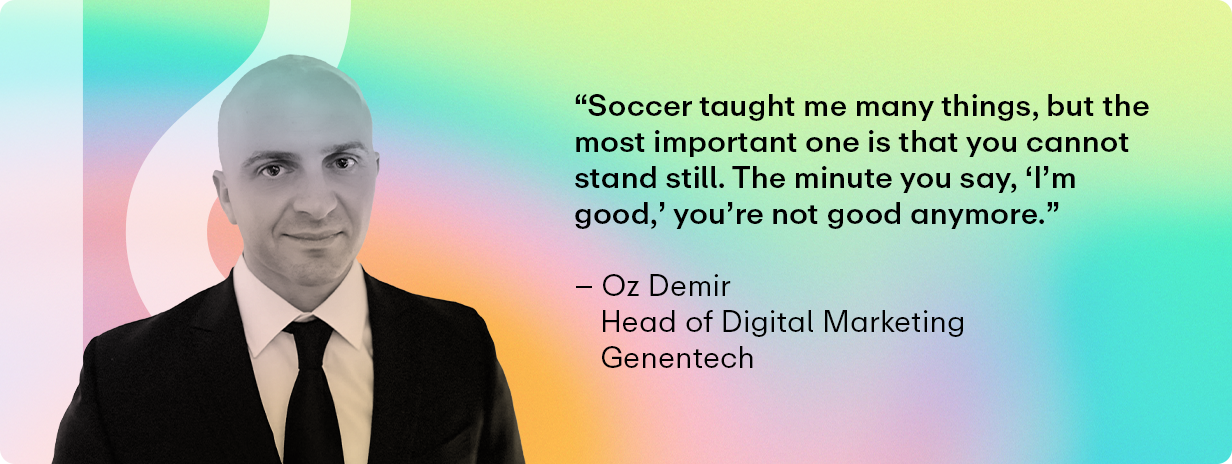Emotional origin stories are legion among life sciences leaders. Many tell of gravitating toward healthcare after a loved one experienced an illness of some seriousness. Others speak of finding their way into the industry’s upper ranks after “carrying the bag” and witnessing firsthand the impact of the products they sold.
Then there’s Genentech head of digital marketing Oz Demir, who has this to say about his own origin story: “It is not inspiring at all.” He punctuates the sentiment with a sharp laugh, adding, “I have to confess that I did not have a noble goal.”
Heading into his final year of college at Sabancı University, where he was studying computer science and engineering, Demir happened upon a school newsletter that listed internship opportunities. One of the listings was for a paid internship at Pfizer in business operations.
“What jumped out at me was ‘paid,’” he admits.
Demir liked the people with whom he interviewed and, after securing the internship, dove into the work with gusto. The day before he graduated, Pfizer extended a full-time job offer, which he eagerly accepted. “I loved it from the minute I got in—the patients, the stories, all of it,” he says.
Demir also relished the challenge that came with digital marketing in the famously restrictive and risk-averse world of life sciences. “You know how everybody always says, ‘We’re so far behind. We just can’t do many things in pharma’? Well, we’re not and we can,” he says emphatically. “I get that change can be scary for some people. The real fun is coming in and confronting it: ‘We can do this and we will do this.’”
Demir’s upbringing was shaped by constant change. Born into a military family, he moved multiple times during his formative years, spending brief stints in a range of towns in his native Turkey as well as in Italy and Hungary.
This gave rise to a genuine facility with languages—Demir is fluent in Turkish, Italian and English, conversational in Spanish and minimally conversational in French and German—but it also left him struggling to forge lasting bonds with his peers. Demir recalls feeling almost fatalistic about the prospect of making new friends: Why put in the effort if he was going to be whisked away to another location in a matter of months?
Team sports became his connective tissue. After his family relocated to Rome, Demir found himself the only non-Italian student in his middle school. He spent his first few weeks shooting a soccer ball into an empty goal before a classmate noticed him and invited him to play with a larger group. Not long after that, another child invited him to try out for a local team.
“That was me connecting to society,” Demir says.
Demir soon added handball and basketball to his sports slate. Years later, he played soccer professionally and competed in a bodybuilding competition. Figuring out how to assimilate with his early soccer teammates, however, was crucial to his desire to forge a distinct identity and establish a healthy sense of self. It also shaped Demir’s personal and professional outlook.
“Soccer taught me many things, but the most important one is that you cannot stand still. The minute you say, ‘I’m good,’ you’re not good anymore,” he says.
It shouldn’t be surprising that an individual reared on team sports has grown up to valorize the team unit. “If a team doesn’t move together, it doesn’t matter how good all the players are—you’re going to lose,” Demir continues. “The teams I’ve built over the course of my career might not have had the most skills, but we were always motivated to rally behind a common mission.”
This, in fact, has become Demir’s calling card within the industry. “He shows up as a leader of leaders,” says Kristen Tappan, group SVP, engagement strategy, at CMI Media Group. “He consistently builds collaborative and transformative teams and then empowers and fosters growth within them.”
“Oz possesses a ‘nothing is impossible, let’s get it done’ mentality, and with the pull-through to truly make the impossible happen,” adds CMI Media Group president and CEO Dr. Susan Dorfman.
After half a decade at Pfizer, Demir joined Bayer as a multichannel manager. He moved to the United States in 2014 after his promotion to associate director of digital marketing, U.S. It was in this role that he experienced his first “eureka!” moment as a pharma marketer.
Demir’s team was eager to promote relapsing multiple sclerosis drug Betaseron and its Betaconnect injector on Facebook, which would have marked Bayer’s first advertising on the platform. He was told point-blank, however, that this just wasn’t possible, because Facebook couldn’t enable a scrolling ISI in its ads.
Demir refused to accept this reasoning. “When I asked, ‘Why can’t we do this?,’ nobody had an answer. It was basically, ‘We can’t do this because it hasn’t been done,’” he recalls. Demir’s solution was to call up “[his] guy at Facebook” and make a case for the scrolling ISI functionality. The Betaseron ad debuted on the platform a few weeks later.
The episode further expanded Demir’s sense of possibility for digital marketing in general as well as his awareness of the need for more—and bolder—change agents within pharma. He doesn’t buy into the belief that industry marketers are clinging to outdated methods. Rather, he feels that a handful of factors have calcified their aversion to risk.
“Sometimes it’s that they don’t think they have the skills. Sometimes they worry about creating more work for themselves that will be abandoned in nine months,” he explains.
The way for digitally fluent leaders to counter this, Demir says, is by actively engaging the skeptics early in a project’s evolution. “When legal says no to things, it’s not because they’re bad people and like saying no. It’s because they sometimes don’t understand what we’re trying to do and think it’s not accomplishable. When there’s resistance, I say, ‘Let’s experiment with a small subset. My commitment to you is that if it doesn’t work, we won’t do it.’”
That approach served Demir well at his next stop, as director, digital strategy, and then as executive director and head, digital strategy, at Novartis Oncology. “The idea was basically, ‘Do what you’re doing at Bayer, but on a larger scale,’” he recalls. When a headhunter contacted him nearly three years ago about his current Genentech job, he was initially lukewarm to the pitch. From afar, he wasn’t impressed by Genentech’s digital operation: “We were behind on measurement, on content, on how we manage media.”
What drew Demir in was then CEO Alexander Hardy’s acknowledgement of the company’s lagging capabilities. The head of digital marketing role that Demir ultimately accepted was created to address those deficiencies and rebuild Genentech’s digital function from the ground up.
Nearly three years into his Genentech tenure, Demir believes that the company distinguishes itself by treating digital marketing, analytics and AI not as isolated functions but as integral components of a core strategy. This, he says, contrasts with organizations that adopt them piecemeal or integrate them slowly and belatedly.
By most internal and external accounts, Genentech has more than caught up with the competition. Despite the recent gains, Demir remains intent on fostering an advanced level of comfort and facility with digital tactics company-wide. To that end, two years ago Genentech debuted its Digital Academy 2 for all members of marketing teams. At its outset, Demir reports, the baseline proficiency score was 57 out of 100; as of January 2025, it had surged to 88.
As for what comes next, Demir says he’s not the type of person to gaze too far into the future. He’s as busy outside the office as he is inside it, traveling extensively (he has visited 42 states and 40 countries) and pursuing his longtime passions for sports and wine (he’s a certified level 2 WSET sommelier). At Genentech, his digital purview may soon expand beyond marketing, possibly to the company’s medical group and field force.
Demir hopes to remain with Genentech for a good long while, ideally building on his current charge. A global role with Genentech parent Roche would appeal to him, as would the Genentech CMO post should Erica Taylor, his current boss, be elevated even higher within the organization.
“My thinking is always, ‘How can we expand what’s already working?’” he says. “There’s a lot here that’s working. I want to see it through.”
Have you worked with a life sciences leader whose personal and professional story would make for an interesting Kinara profile? Drop us a note at hello@kinara.co, join the conversation on X (@KinaraBio) and subscribe on the website to receive Kinara content.




